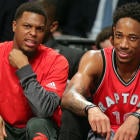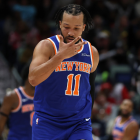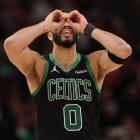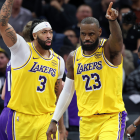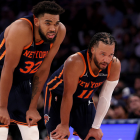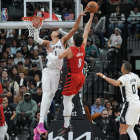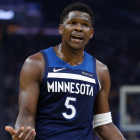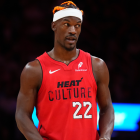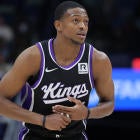TORONTO -- Kyle Lowry wants to live in the moment. Asked about the perception of the Toronto Raptors before he arrived, he joked that he’s old and can’t remember that long ago. The 2015-16 season may have been a magical one for the franchise, but he declared that “everything that we did last year” -- Lowry and DeMar DeRozan representing the Raptors as they hosted All-Star weekend, shattering the franchise record for regular-season victories, winning a first-round series for the first time in 15 years, advancing to the conference finals for the first time ever, taking two games from the eventual champs -- “means nothing to me.” His reasoning: “We have to do it again.”
Really, he wants to do more. The goal, Lowry says, is to “be the best team we can possibly be at the end of the year, and hopefully that can get to the highest level of high -- and we all know what that level is.” He’s talking about getting to the NBA Finals and competing for a championship, even if he won’t say it directly. While he thinks about the big picture, he prefers to focus on the day-to-day process of painting it.
That process, an 82-game grind, has been ugly lately. Toronto was 28-13 in mid-January, its best mark at the midpoint of the season in franchise history. Since then it has slid from second to tied for fourth in the Eastern Conference, with 10 losses in their last 14 games and a disturbing lack of crunch-time poise. Only the Golden State Warriors have been better on offense, but the Raptors’ defensive rating ranks 17th in the league.
After one recent loss, Toronto guard Norman Powell said they can’t afford to wait “until we get punched in the mouth to start playing hard and playing tough.” Lowry told reporters on Sunday, following a 102-101 loss to the Detroit Pistons, that he’s “starting to get worried” and “something got to give and something’s got to change.”
On Tuesday, something did: The Raptors acquired Serge Ibaka from the Orlando Magic, a move that signals they mean business. They’ve come way too far to let the season slip away.

DeRozan will not forget how bleak things were. After franchise player Chris Bosh left for the Miami Heat in free agency, the 2010-11 Raptors won 22 games, matching the number of players who suited up for them. Their 60 losses included seven of their first eight games and a 13-game losing streak. It was DeRozan’s second season in the NBA, but sometimes he felt like he wasn’t even a part of it.
“I remember how it sucked,” DeRozan said. “It was a terrible feeling. You’re putting in all this work and you’re losing. Teams are just beating you. It made you feel like you wasn’t in the league for a period of time. It was something that kept you going because it was a great way of letting you know, don’t stop now. You got to get through this part. It can’t get no worse than this.”
He trudged to the practice court on off-nights to get in extra work, but also to get his mind off how the season was going. Sometimes it was hard to believe Toronto’s veterans and assistant coaches who told him that things would turn around, but he stuck to his routine.
Maybe all these extra jumpers and floaters wouldn’t change anything right away, DeRozan told himself, but it could pay off down the road. It wasn’t just about his own player development, it was about changing the perception of the franchise -- in DeRozan’s words, the Raptors were “nonexistent” to everybody else.
“We really didn’t get respect around the league when other teams came in and played us,” DeRozan said. “We were always overlooked. We always had that stigma of being the team that’s in another country. It was always that feeling around the whole league and around outside fans.”
Toronto finished the season with the worst defense in the NBA, and then-general manager Bryan Colangelo addressed the situation with a coaching change. Out went Jay Triano, in came Dwane Casey, who built the scheme that slowed down the Miami Heat’s Big 3 in the 2011 NBA Finals as an assistant coach with the Dallas Mavericks.
He arrived not just with a chip on his shoulder, but a massive boulder -- Casey had a 1,300-pound rock placed in the locker room. This was an allusion to the Jacob Riis quote that Gregg Popovich has had on the wall of the San Antonio Spurs’ locker room since the days David Robinson had a nameplate. Starting in training camp, players ended each huddle yelling, “Pound the rock!”
Casey wanted to start building a Spurs- or Mavericks-like culture, but he had a lockout-shortened training camp and limited resources. Instead of Tyson Chandler patrolling the paint, he had Aaron Gray and Jamaal Magloire. Instead of Dirk Nowitzki, he had Andrea Bargnani.
“My goal at that time was try to make sure we kind of emulate what we did in Dallas offensively and defensively,” Casey said. “Try to transform Bargnani into the closest thing to Dirk as much as we possibly could. That was my thoughts going into that first year. And to get out of the basement defensively.”
No one could turn Bargnani into Dirk, but the Raptors did improve to 14th in defensive rating, an achievement almost as miraculous. They practiced as much and as hard as possible, given the constraints of the 66-game season. DeRozan is the only player still on the roster, but the seeds of today’s team were planted back then.
“I think it’s important that you have a culture, what you stand for, how hard you play,” Casey said. “We wanted to be an unselfish, defensive, hard-playing team. We want to outwork the opponent each and every night. I think that’s very important -- building a culture, what you stand for, what’s permissible and what a Raptor looks like when he walks down the street.”

Patrick Patterson heard talk about tanking when he arrived in Toronto in December 2013. Mere months later, he and his new teammates marveled at the masses of people watching their playoff games on the 50-by-80-foot screen in Maple Leaf Square outside of Air Canada Centre. The Raptors have broken their franchise record for wins in each of the last three seasons, and nobody saw this ascension coming.
At his introductory press conference in June 2013, general manager Masai Ujiri declared that they needed an identity. Sitting at the BioSteel Centre, the team’s new practice facility, Patterson defined that identity succinctly.
“Kyle and DeMar,” Patterson said. “Simple as that. Kyle and DeMar are the Toronto Raptors.”
Toronto regained relevance thanks to a few trades that were made (Lowry to Toronto, Bargnani to New York, Rudy Gay to Sacramento) and one that wasn’t (Lowry to New York). When Lowry and DeRozan established themselves as the main cogs of the offense, things started falling into place.
“We ride or die with them,” Patterson said. “Our offense is based around those two guys. It’s based on them making shots, having the ball in their hands, demanding attention out there on the court from the opposition and us creating off of that. It’s been like that for the longest time, and it’s always going to be like that because they are the face of Toronto. They are what makes this team go. They are what makes us win.”
Lowry and DeRozan will both play for the East in the All-Star Game again on Sunday, but they are not typical stars. Lowry was benched at each of his three NBA stops, including his first season under Casey, developing a reputation as “uncoachable” that took years to shake. DeRozan was doubted and dismissed because of his midrange-heavy style, but stayed determined to do things his way. They are both in the midst of career years.
“He didn’t have the easiest route, and I didn’t either,” DeRozan said. “That’s something we always can connect to subconsciously, and it’ll bond us together to push us harder. And you see how hard we work. Every day, we work for it. To this day.”
DeRozan said that their prove-them-wrong attitude carries over to the whole team. Lowry points to the fact that few Raptors were ranked highly in high school. The underdog should never lack for motivation.
“All these teams playing on ESPN and TNT and Christmas games, getting all this limelight, and they’re not nearly as good as we are,” Patterson said. “I’ll gladly say that. It’s been like that for the longest time since I’ve been here. We pay attention to it. We see it. I’m not going to sit here and lie and say we don’t.”
Casey said Lowry and DeRozan are “not screamers, they’re not cussers, they’re not guys that are going to jump up and down. But they’re guys that lead by example.” They make their coach’s job easier by showing their younger teammates how to work, encouraging them and helping them fit in. Lowry said he takes “immense pride” in what he and DeRozan have helped to build.
“Me and DeMar have accepted being leaders of the team and accepted what it takes to be good leaders of a team and an organization,” Lowry said. “And I think we took that upon ourselves to make sure that we’re good. But I think now, I think we’ve created a culture and a vibe that will continue to grow.”

There’s that word again: culture. As the Raptors reached new heights, they were held up as an example of how to construct a team without a top-three draft pick or hitting a home run in free agency. Ujiri exhibited patience and valued continuity. Chemistry allowed Toronto to be more than the sum of its parts. The on-court product had a recognizable style, which fit the personnel rather than following the league’s trends toward pushing the pace and launching 3-pointers at a high rate.
“What Casey’s done here is implemented a culture and a system,” Popovich said. “It doesn’t happen immediately, but as you all know by now, they’ve bought in, everybody knows what the deal is. He’s going to be consistent, he’s going to be demanding, he’s going to be fair. It starts with defense. Because no team is the last team standing without being a really good defensive team. And he’s always known that, he’s always been like that and he’s had the courage to do that here and people are figuring it out. He’s got a good group, good character group, talent is better every year. That’s where they are where they are. They’re a contender without a doubt.”
Popovich said that before the Spurs’ game against the Raptors on Jan. 24, back when their three-game losing streak could be written off as a January malaise. The praise sounds different now, though the Ibaka trade presents new hope. With a solid foundation, perhaps the big man is the missing piece.
Forward DeMarre Carroll’s knee issues have limited him since he signed with the Raptors in the summer of 2015. Center Jonas Valanciunas is not an advanced enough positional defender to make up for his lack of mobility, so he still routinely gets benched for Lucas Nogueira in fourth quarters. Patterson has has still not recovered from straining his left knee in late December. Offseason addition Jared Sullinger had foot surgery in the preseason and isn’t in playing shape. Ibaka can theoretically fix most of these problems, as long as Patterson gets healthy. This is the big move that fans in Toronto have been begging for.
“[Ujiri] doesn’t let people affect his mindset or his decision-making,” Patterson said two-and-a-half weeks before the deal went down. “He’s very calm, he’s very comfortable, he’s very cool and collected. And he knows what we need, what we don’t need, what we need to do, what we don’t need to do. And he always makes the right decision.”

Every time a team changes the balance of its ecosystem, there is risk. There is also risk, however, in standing pat. What happens when a solid culture isn’t enough? Does continuity have its downsides? Surely after seeing a teammate miss a passing angle or a defensive rotation enough times, it gets on your nerves.
“People do get tired of each other,” Patterson said. “You see people make the same mistakes in film and you get frustrated, you get upset. But luckily, with that continuity, with that togetherness that we have, we’re able to get on each other and no one take it the wrong way.”
Patterson elaborated: The players are “extremely close” and they know each other’s tendencies, where they like to catch the ball, how they like to be treated. They get along and spend time with each other on and off the court. DeRozan, though, told reporters twice recently that getting some help before the deadline would be nice. Ibaka represents major help in the form of rim protection, outside shooting and versatility.
This is unfamiliar territory for Toronto. Expectations have never been higher, and there are stakes beyond this season, with Lowry hitting free agency in the summer. Patterson, ever the optimist, speaks reverentially about how Ujiri wants to win a championship in Toronto and hopes that the team will be seen the same way as the Spurs one day.
“[Ujiri] is the mastermind behind it all. He sees things that other people don’t see,” Patterson said. “I would say he’s a tremendous chess player. He’s strategizing for the greater goal at the end.”
The Raptors were under pressure this time last year, too, but they were looking to erase the memory of a first-round sweep rather than build on a trip to the conference finals. The organization has a responsibility to make the most of this moment, and acquiring a player who all but guarantees they’ll pay the luxury tax next year is a reflection how high the stakes have risen.
Like his point guard, though, Casey prefers not to reminisce. The question on his mind, he said, is the same as everyone else’s: “How do we take that next step forward?”









